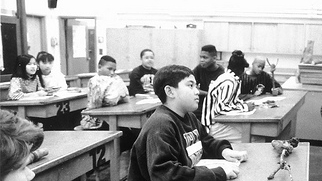

The Denver Classroom Teachers Association survey that included feedback from 2,100 teachers was presented to the Denver Board of Education Thursday night.
The good news in the survey is that 70 percent of teachers felt safe in their buildings.
More than half of respondents said behavior and character education programs would or are already improving school culture.
Teachers surveyed by the association said disruptions from a few students are preventing other kids from learning.
“I have had students say to me, 'Mrs. Spence, I am sick and tired of the kids in the classroom who over and over again are allowed to disruptive,’” high school advisor Jane Spence told the board. “We need to break that cycle.”
The union’s discipline committee hopes to bring about changes to DPS’s complex discipline ladder as it requires teachers to have many documented discussions with a disruptive student, implement interventions, call the parent and repeat the process many more times before a disruptive student can be removed from class.
The DPS discipline process
Bruce Randolph High teacher Greg Ahrnsbrak asked board members to imagine being in a classroom in which a teacher is giving a lesson when
a student suddenly jumps up and starts yelling obscenities at the teacher.
“We can’t write a referral and send them out,” Ahrnsbrak said.
Ahrnsbrak said teachers must instead hand students a reflection sheet and ask them to very politely go back to their table and fill it out quietly.
The reflection sheet asks the student to identify the problem, who is being harmed, what the student is doing to help fix the problem and how he or she is feeling.
“If they don’t fill that out or they refuse or continue to create a disturbance, we can call security and have them removed but that takes some time,” Ahrnsbrak said. "In the meantime, you’ve got 30-some-odd other students there that you need to get back on track -- get focused back on the lesson.”
Ahrnsbrak said teachers may have a dozen behavior events a day, each one taking at least 20 minutes to handle.
Survey results at a glance
- About half of teachers said they spent 10 percent of their time just documenting incidents.
- 63 percent disagreed with the statement “students are held accountable for their negative behavior.”
- 50 percent didn’t think their administration helped teachers to resolve issues with habitually disruptive students.
- 86 percent said it’s a small percentage of students who are the cause of majority of problems.
Teachers' Union recommendations
Since January, the union has been working with district and board members on discipline issues.
Through these efforts, the district and board members made a series of recommendations on social, emotional and character education in May and the next step is to make recommendations on discipline and bullying.
The union had several recommendations including working with the board on strategies to improve student behavior, studying which students present the biggest issues and eliminating DPS meetings that require all administration to be gone from the school building.
“This leaves building safety and security at greater risk,” the survey noted.
In addition, the Denver Classroom Teachers Association survey of teachers asked about time.
Three-quarters of teachers responded that they were “somewhat or completely overwhelmed.”
Nearly that amount said they had “significantly less time to do things like mentor students, sponsor clubs/activities and attend student functions.”







